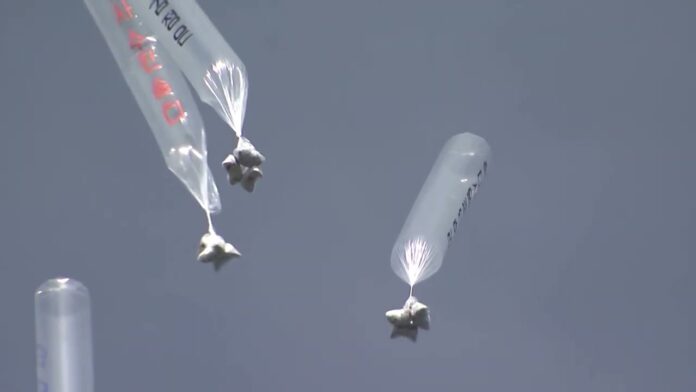Pyongyang warns of resumption if South Korean propaganda leaflets continue
North Korea announced it would halt its campaign of sending balloons filled with rubbish over the border to South Korea but warned it would resume if anti-North Korean leaflets continue to be launched from the South. This development follows Pyongyang’s recent tactic of using balloons to deliver tons of trash across the heavily fortified border.
The North’s vice-minister of defence, Kim Kang Il, stated on state media outlet KCNA that South Korea has experienced firsthand the unpleasantness and labour involved in cleaning up the debris. Pyongyang’s recent campaign involved sending 15 tons of trash using 3,500 balloons.
In response, South Korea has declared its intent to take “unendurable” measures against North Korea for these provocative acts. These measures could include resuming the blaring of propaganda from loudspeakers directed at the North, a practice that was halted in 2018 following a summit between South Korean President Moon Jae-in and North Korean leader Kim Jong Un.
President Yoon Suk Yeol’s office made the announcement after a meeting of the National Security Council, which was convened to address the issue. The council condemned the trash balloons and simultaneous GPS jamming as “irrational acts of provocation.” A senior official at Yoon’s office indicated that the resumption of loudspeaker broadcasts is a possibility, depending on North Korea’s actions.
The democratic South and communist North remain technically at war since the Korean War ended in an armistice rather than a peace treaty in 1953. Seoul is a staunch US ally, and its sophisticated military frequently conducts drills with US forces. Meanwhile, Pyongyang continues to develop missile and nuclear technology, which Seoul and Washington assert violates UN resolutions.
North Korea’s balloon campaign was reportedly a retaliatory measure against South Korean activists and defectors. These groups regularly send balloons carrying anti-Pyongyang leaflets, food, medicine, money, and USB sticks loaded with K-pop music videos and dramas across the border.
The North Korean balloons, filled with garbage such as cigarette butts, cloth, paper waste, and plastic, were discovered across the South Korean capital Seoul from Saturday evening until Sunday afternoon. South Korea’s Joint Chiefs of Staff reported that the trash balloons were found in various locations from 8 PM on Saturday to 1 PM on Sunday.
Analysis:
The suspension of North Korea’s trash balloon campaign underscores the ongoing tension and hostility between the two Koreas. Politically, this situation highlights the fragile and volatile nature of inter-Korean relations. North Korea’s use of trash balloons as a retaliatory measure against South Korean propaganda leaflets reflects a tit-for-tat strategy aimed at escalating psychological warfare. This tactic serves as a low-cost, low-risk method for Pyongyang to express its displeasure and disrupt life in the South without crossing the threshold into more overtly aggressive actions.
From a sociological perspective, the trash balloons serve as a form of symbolic warfare, intended to humiliate and inconvenience South Korea. The use of everyday waste as a weapon emphasizes the disdain North Korea holds towards the South and its efforts to undermine the regime. This strategy also impacts the civilian population of South Korea, creating a sense of vulnerability and irritation among those who find the debris.
Economically, the cost of cleaning up the trash and mitigating the environmental impact can be significant. While the immediate financial burden may not be substantial, the broader implications of a continued campaign could strain local resources and divert attention from other critical areas. Moreover, the ongoing tensions and provocations can affect investor confidence and economic stability in the region.
The international community views the situation through the lens of broader geopolitical dynamics. North Korea’s actions serve as a reminder of the persistent threat it poses to regional stability. The international response, particularly from the US and its allies, will likely involve a combination of diplomatic pressure and reaffirmed military support for South Korea. This could further isolate North Korea but may also provoke additional provocative actions from Pyongyang.
In terms of gender and minority perspectives, the ongoing conflict and these psychological tactics impact all demographics within South Korea. Women, children, and marginalized communities might experience heightened anxiety and stress due to the perceived threat from the North. The use of propaganda and psychological tactics can have long-lasting effects on mental health and social cohesion.
Finally, the environmental impact of the trash balloons cannot be overlooked. The debris adds to pollution and requires significant effort to clean up, potentially affecting local ecosystems and public health. This environmental dimension adds another layer of complexity to the already multifaceted conflict between the two Koreas.
Overall, the suspension of North Korea’s trash balloon campaign represents a temporary de-escalation, but the underlying tensions and hostilities remain. The situation requires careful management to prevent further provocations and to work towards a more stable and peaceful relationship on the Korean Peninsula.
